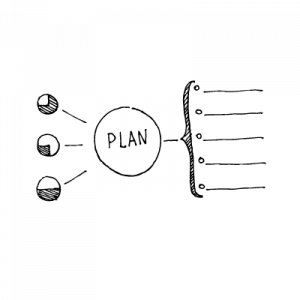Clear career goals make every other MBA decision easier. Even a working hypothesis about your ideal next role helps you evaluate schools and formats more effectively than starting with rankings or locations.
Many aspiring MBA students want to "keep their options open." But this approach often leads to poor choices. Let me explain why through two contrasting examples.
The Triple Jump Challenge
Consider someone aiming for what I call the "triple transition" - changing industry, role, and country simultaneously. For example: an operations manager at an Indian pharmaceutical company who wants to become a strategy consultant in London.
This ambitious shift requires:
-- Building new technical skills
-- Developing country-specific business understanding
-- Creating a professional network from scratch
-- Proving capability in a new function
-- Navigating visa requirements
For this scenario, a full-time MBA at a top school is often the only realistic path. The school's career services, alumni network, and internship opportunities become critical. The concentrated period of study and career preparation makes the dramatic transition possible.
The Diagonal Path
Now consider someone making a more gradual transition. Perhaps a tech marketer in London who dreams of becoming a COO in Italy's food industry. Rather than attempting all changes at once, they might:
-- Complete a part-time MBA while working
-- Move into consulting, specializing in marketing operations
-- Transition in-house to operations at a food wholesaler
-- Step up to COO at a producer
This "diagonal" approach:
-- Reduces career risk through smaller jumps
-- Provides learning opportunities to test career hypotheses
-- Allows building relevant experience progressively
-- Makes each transition more credible to employers
Testing Your Hypothesis
Your initial career goal need not be final. Think of it as a hypothesis to test. As you research schools and speak with alumni, you'll refine your understanding of:
-- Which roles match your skills and interests
-- Where you can create most value
-- What paths others have taken
-- Which transitions are realistic
This exploration process works better with a starting point. You can ask focused questions about specific career paths rather than trying to evaluate every possibility.
Making Better Choices
With clear goals, even tentative ones, you can better evaluate:
-- Program formats (full-time vs part-time vs executive)
-- School locations and their access to target industries
-- Curriculum offerings and specializations
-- Career services and recruitment patterns
-- Alumni networks in your target sector
The MBA represents a significant investment of time and money. Starting with career goals helps ensure that investment serves your long-term aspirations rather than just adding a credential to your resume.
Why Career Goals Should Drive Your MBA Choice
Posted Nov 11, 2024 12:44
Clear career goals make every other MBA decision easier. Even a working hypothesis about your ideal next role helps you evaluate schools and formats more effectively than starting with rankings or locations.
Many aspiring MBA students want to "keep their options open." But this approach often leads to poor choices. Let me explain why through two contrasting examples.
The Triple Jump Challenge
Consider someone aiming for what I call the "triple transition" - changing industry, role, and country simultaneously. For example: an operations manager at an Indian pharmaceutical company who wants to become a strategy consultant in London.
This ambitious shift requires:
-- Building new technical skills
-- Developing country-specific business understanding
-- Creating a professional network from scratch
-- Proving capability in a new function
-- Navigating visa requirements
For this scenario, a full-time MBA at a top school is often the only realistic path. The school's career services, alumni network, and internship opportunities become critical. The concentrated period of study and career preparation makes the dramatic transition possible.
The Diagonal Path
Now consider someone making a more gradual transition. Perhaps a tech marketer in London who dreams of becoming a COO in Italy's food industry. Rather than attempting all changes at once, they might:
-- Complete a part-time MBA while working
-- Move into consulting, specializing in marketing operations
-- Transition in-house to operations at a food wholesaler
-- Step up to COO at a producer
This "diagonal" approach:
-- Reduces career risk through smaller jumps
-- Provides learning opportunities to test career hypotheses
-- Allows building relevant experience progressively
-- Makes each transition more credible to employers
Testing Your Hypothesis
Your initial career goal need not be final. Think of it as a hypothesis to test. As you research schools and speak with alumni, you'll refine your understanding of:
-- Which roles match your skills and interests
-- Where you can create most value
-- What paths others have taken
-- Which transitions are realistic
This exploration process works better with a starting point. You can ask focused questions about specific career paths rather than trying to evaluate every possibility.
Making Better Choices
With clear goals, even tentative ones, you can better evaluate:
-- Program formats (full-time vs part-time vs executive)
-- School locations and their access to target industries
-- Curriculum offerings and specializations
-- Career services and recruitment patterns
-- Alumni networks in your target sector
The MBA represents a significant investment of time and money. Starting with career goals helps ensure that investment serves your long-term aspirations rather than just adding a credential to your resume.
Many aspiring MBA students want to "keep their options open." But this approach often leads to poor choices. Let me explain why through two contrasting examples.
The Triple Jump Challenge
Consider someone aiming for what I call the "triple transition" - changing industry, role, and country simultaneously. For example: an operations manager at an Indian pharmaceutical company who wants to become a strategy consultant in London.
This ambitious shift requires:
-- Building new technical skills
-- Developing country-specific business understanding
-- Creating a professional network from scratch
-- Proving capability in a new function
-- Navigating visa requirements
For this scenario, a full-time MBA at a top school is often the only realistic path. The school's career services, alumni network, and internship opportunities become critical. The concentrated period of study and career preparation makes the dramatic transition possible.
The Diagonal Path
Now consider someone making a more gradual transition. Perhaps a tech marketer in London who dreams of becoming a COO in Italy's food industry. Rather than attempting all changes at once, they might:
-- Complete a part-time MBA while working
-- Move into consulting, specializing in marketing operations
-- Transition in-house to operations at a food wholesaler
-- Step up to COO at a producer
This "diagonal" approach:
-- Reduces career risk through smaller jumps
-- Provides learning opportunities to test career hypotheses
-- Allows building relevant experience progressively
-- Makes each transition more credible to employers
Testing Your Hypothesis
Your initial career goal need not be final. Think of it as a hypothesis to test. As you research schools and speak with alumni, you'll refine your understanding of:
-- Which roles match your skills and interests
-- Where you can create most value
-- What paths others have taken
-- Which transitions are realistic
This exploration process works better with a starting point. You can ask focused questions about specific career paths rather than trying to evaluate every possibility.
Making Better Choices
With clear goals, even tentative ones, you can better evaluate:
-- Program formats (full-time vs part-time vs executive)
-- School locations and their access to target industries
-- Curriculum offerings and specializations
-- Career services and recruitment patterns
-- Alumni networks in your target sector
The MBA represents a significant investment of time and money. Starting with career goals helps ensure that investment serves your long-term aspirations rather than just adding a credential to your resume.
Hot Discussions
-
Torn Between Ivey and RSM: What Would You Choose?
Oct 29, 2024 245 12 -
Best School for a JD/MBA Dual Degree?
Nov 03, 2024 3,969 10 -
accreditation of french business schools
Oct 23, 2024 953 9 -
Gut check
Nov 11, 2024 102 4 -
Are executive short courses that bad? Any alternatives if employer pays?
Nov 13, 2024 94 4 -
Why do US schools like to hide their tuition fees?
Nov 09, 2024 96 4 -
OHM MBA in Germany
Nov 06, 2024 76 4 -
eMBA or executive MSc Finance - Dilemma
Nov 12, 2024 69 3



